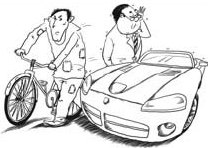 A commentary in People's Daily last week said some media outlets still take pleasure in churning out false news.
A commentary in People's Daily last week said some media outlets still take pleasure in churning out false news.
The latest example, it said, was a widely spread report that there are 3,220 people on the Chinese mainland whose personal wealth exceeded 100 million yuan ($14.6 million) each, and 2,932, or 91 percent, of them are children of high-ranking officials. "This is an out and out false news," the commentary said, citing some authoritative institutions that were rumored to be the source of the news.
The commentary analyzed the reason why false news could still be spread after so many cases had been revealed and denounced. It said false news generally suits readers' and viewers' "consumption needs". Meeting these needs can "bring huge commercial benefits" to the media, it said.
Two questions arose in my mind after I read the commentary. First, why does the above news "suit the readers' and viewers' consumption needs?" Second, where can they get true information on the subject?
The public is concerned over reports of rich people's income because it resents that a Shanxi coalmine boss bought 100 million yuan ($14.7 million) worth of villas in Beijing in the first half of this year while a blue-collar worker in the city needs to work and save for 90 years to be able to buy a second-hand 70-sq-m apartment. The public also resents the fact that the general manager of State-owned Sinopec squandered 40,000 yuan ($5,882) a day on banquets while a man in the countryside committed suicide because he couldn't pay 4,800 yuan a year to help his son realize his dream of studying in a university. All these incidents have been reported by the Chinese media.

The income gap between the rich and the poor is apparently huge. But there has never been specific data on how large the gaps are between different social strata. Look for the facts on any search engine on the Internet and you will find different versions of the Gini coefficient in China. The only seemingly reliable version is the index the National Bureau of Statistics published in 2004, which was 0.47, well above the internationally acknowledged alarming level of 0.4.
Now, after five years, nobody knows how bigger or smaller the coefficient has grown. But the general impression is that the rich-poor income gap is wider than five years ago. That shows why people are agitated when they come across data on distribution of social wealth in the media. None of these media reports seem reliable, yet, for they often contradict each other and there's no authoritative source to confirm them.
One could ask: "Why do the competent authorities not publish official data on how social wealth is distributed among society's members?" Or, we could ask: "Did they ever study the problem?"
Finding the truth may be a difficult task because many big money earners tend to hide their wealth. But I don't think the task is difficult enough for the authorities to carry out. Nowadays, when common netizens can dig out detailed information on any person they are interested in through renrou shouso (or "human flesh search") why are official statistical institutions unable to get data on the distribution of social wealth?
The author of the commentary published in People's Daily ended his criticism of some irresponsible media outlets by saying: "They may be saving the trouble of checking the facts and promote sensation and commercial benefits, but they will lose their authenticity and credibility." I would like to use some of his words to conclude my column: "The statistical authorities can save the trouble of doing a difficult task, but by doing so they will lose their authenticity and credibility."
E-mail: liushinan@chinadaily.com.cn
About the author:
劉式南 高級編輯。1968年畢業于武漢華中師范學院(現華中師范大學)英文系。1982年畢業于北京體育學院(現北京體育大學)研究生院體育情報專業。1982年進入中國日報社,先后擔任體育記者、時政記者、國際新聞編輯、要聞版責任編輯、發稿部主任、《上海英文星報》總編輯、《中國商業周刊》總編輯等職。現任《中國日報》總編輯助理及專欄作家。1997年獲國務院“特殊貢獻專家政府津貼”。2000年被中華全國新聞工作者協會授予“全國百佳新聞工作者”稱號。2006年獲中國新聞獎二等獎(編輯)。
相關閱讀:
No leniency for violators of traffic law
How to make a clean sweep of waste handling
Accident law leaves a lot to be desired
